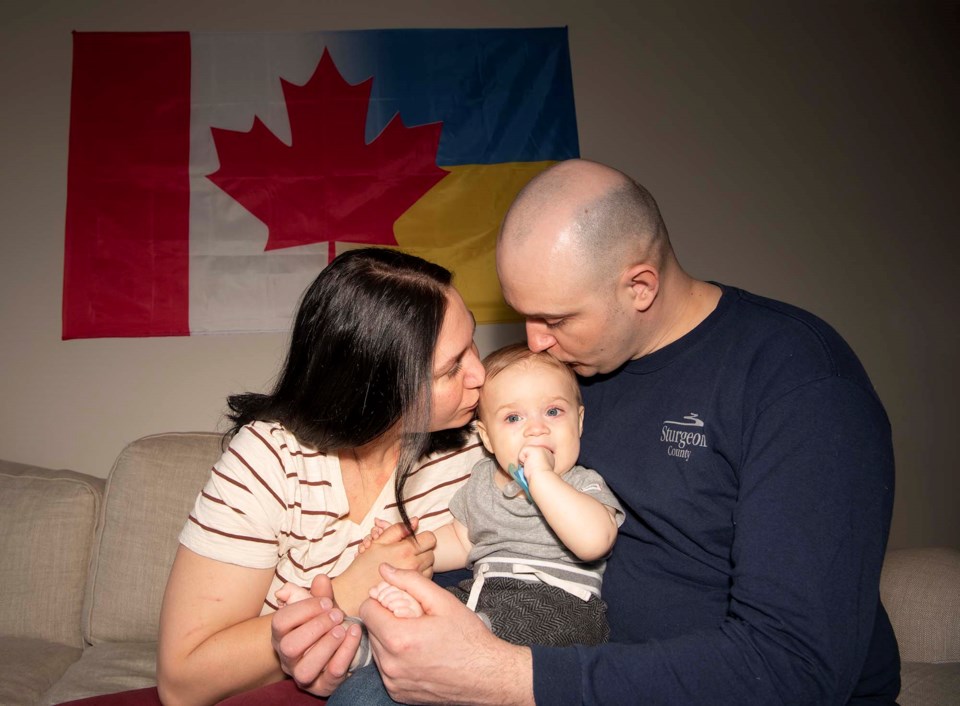Just over a year ago, Tetiana Rozhkova lost her home in Ukraine for a second time.
The first time was back in 2014 when Russia seized the Crimea and backed a violent separatist movement in the Donbas region. Rozhkova had been walking her dog with her then-fiancé Oleksandr in Donetsk (a city in the Donbas) when an angry militant aimed a rifle at them, threatening to shoot them if he ever saw them there again.
Rozhkova and Oleksandr fled their home with little more than a backpack’s worth of possessions. Months later, they found work and a home in Poland. Eventually, they married, bought a farm in Oleksandr’s home village of Bondareve, and made plans to move there to grow sunflowers and wheat.
They were all set to fly to their new home on Feb. 24, 2022, when they got the news: Russia had invaded Ukraine. Bondareve, some 43 km from the Russian border, was now occupied territory.
“For the first two days, it was frustrating. We didn’t know what to do,” said Rozhkova, who now lives in St. Albert.
“For the second time, we lost everything.”
A search for peace
Rozhkova is one of the roughly 21,000 Ukrainian newcomers who have come to Alberta since Russia’s invasion of Ukraine in February 2022, data from the Ukrainian Canadian Congress suggests. Around 440 of them have settled in St. Albert, estimated Cheryl Dumont of the St. Albert Further Education Centre, based on the number of Ukrainian families the centre’s Newcomer Connection program had worked with since the invasion started. (Her estimate did not include Ukrainians that did not seek help from the centre.)
“We are the fourth largest centre for receiving Ukrainians,” Dumont said of the St. Albert and Sturgeon County region, citing data from the Ukrainian Canadian Congress, coming in behind Red Deer, Edmonton, and Calgary.
Too stressed to eat or sleep, Rozhkova said she and Oleksandr spent all day scrolling through the news when the 2022 invasion started, calling everyone they knew to encourage them to flee to Poland. A former soldier and police officer, Oleksandr volunteered to come home to fight, but was told by army officials to stay abroad as he was not yet needed.
Rozhkova said she and her husband pooled their savings with others to donate five carloads of medical supplies plus an ambulance to Ukraine. They also gathered clothes to give to refugees waiting in line for days to cross the border into Poland.
Pregnant with her first child, Rozhkova realized she and her husband would soon be forced out of Poland — they needed to renew their government documents to stay, and the only place they could do so was in occupied Ukraine.
“It was a dark corner for us,” she said.
A new home
At that point, Canada had started its Canada-Ukraine Authorization for Emergency Travel program to let Ukrainians quickly get visitor visas to live and work in Canada. Seeking a better future for their child, Rozhkova and Oleksandr applied for the visa and reached out to David Benjestorf for help.
Benjestorf, a lawyer and vice chair of the Edmonton Food Bank, lives just outside St. Albert in Sturgeon County.
“When the first Russian tank crossed that Ukrainian border, I knew what atrocities were about to happen,” he said — he had been in Chechnya as a student and saw first-hand what happened when Russian troops invaded.
Benjestorf reached out through Facebook and the I Can Help Host website to help as many Ukrainians as possible. Using his connections, he has so far helped host 34 families, which often involved paying for air fare, finding local homes, collecting donations, and assisting with paperwork.
“I promised my wife we would stop at 10, but they just kept coming faster and faster,” he said.
Benjestorf said he got a message from Rozhkova online a few weeks before she and her husband arrived in Canada last May. He helped them find a home, food, clothes, furniture, and jobs, and still keeps in touch with them, along with every other Ukrainian he’s helped.
“I really do look at them as family,” he said.
Rozhkova said she and her husband moved to St. Albert because it was safe, green, and quiet. Now, they have a small apartment with a computer, couch, and a stuffed elephant for their six-month old son, Jason.
Oleksandr’s mother joined them in February 2023, having fled Bondareve after Russian troops threatened to torture her for information, Rozhkova said. Jets with rockets now roar overhead twice a day in that village, where the streets are now clogged with concrete barriers and checkpoints.
While she was saddened to see the war still going on after a year, Rozhkova said she was proud of how the war had brought Ukrainians together.
“We’re working as one nation for our county.”
Rozhkova said she hopes to tell her son about why they came to Canada when he grows up, and to have him learn about Ukraine’s language and history. For now, she and her husband have no plans to go back to Ukraine.
“We would like to live the common life as everybody (does): to have a home, to raise a child, and to have a job,” she said.



